Federation University Commercial Law: Agency Law Analysis Assignment
VerifiedAdded on 2022/11/28
|10
|2681
|475
Homework Assignment
AI Summary
This assignment analyzes agency law, focusing on a case involving Leegall Lore & Associates (LLA) and Glitz cruisers. It examines the liability of LLA for actions taken by a former partner, Mike, who had resigned but whose departure was not publicly announced. The analysis applies common law agency principles and the Partnership Act, particularly concerning apparent authority. The case explores whether LLA is liable for Mike's actions, including a holiday expense, after he had left the firm, emphasizing the concept of ostensible authority. The assignment references key legal cases like Freeman & Lockyer v Buckhurst Park Properties Ltd and Wilson v Tumman to support its arguments, and concludes that LLA bears liability towards Glitz cruisers based on the principles of agency law. Additionally, the assignment briefly touches upon the Royal Commission into Misconduct in the Banking, Superannuation and Financial Services Industry, specifically focusing on the recommendation regarding the prohibition of hawking of insurance products.
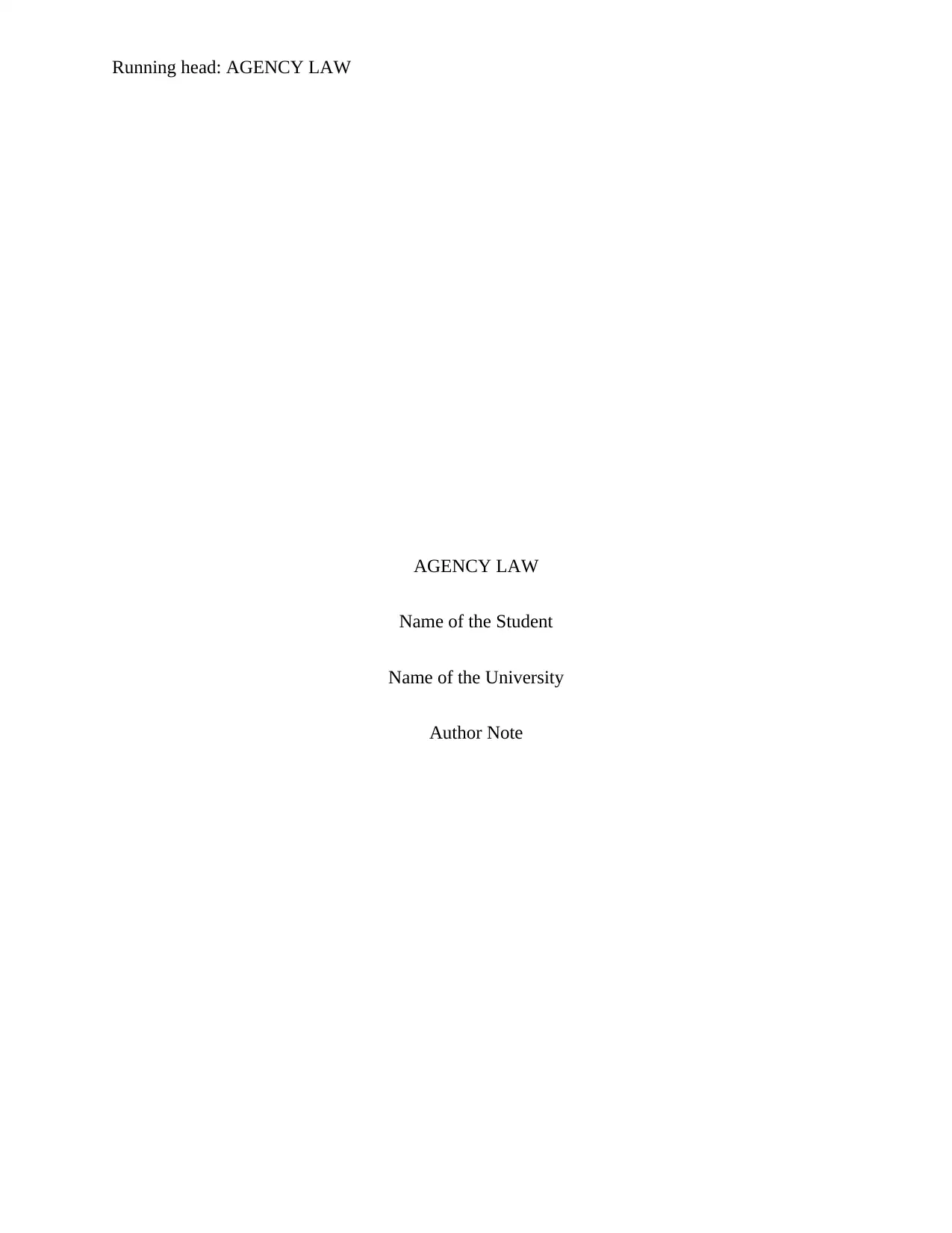
Running head: AGENCY LAW
AGENCY LAW
Name of the Student
Name of the University
Author Note
AGENCY LAW
Name of the Student
Name of the University
Author Note
Paraphrase This Document
Need a fresh take? Get an instant paraphrase of this document with our AI Paraphraser
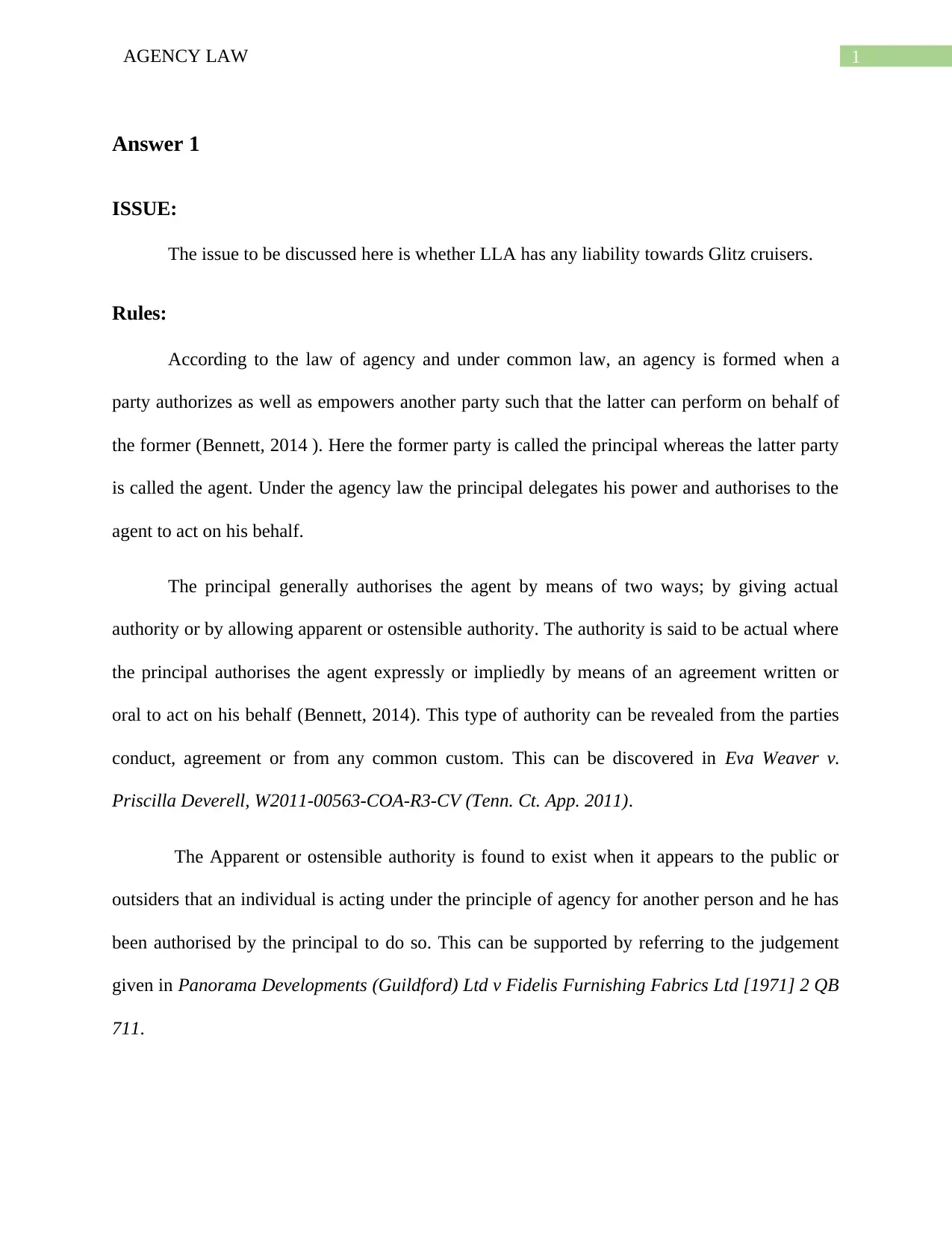
1AGENCY LAW
Answer 1
ISSUE:
The issue to be discussed here is whether LLA has any liability towards Glitz cruisers.
Rules:
According to the law of agency and under common law, an agency is formed when a
party authorizes as well as empowers another party such that the latter can perform on behalf of
the former (Bennett, 2014 ). Here the former party is called the principal whereas the latter party
is called the agent. Under the agency law the principal delegates his power and authorises to the
agent to act on his behalf.
The principal generally authorises the agent by means of two ways; by giving actual
authority or by allowing apparent or ostensible authority. The authority is said to be actual where
the principal authorises the agent expressly or impliedly by means of an agreement written or
oral to act on his behalf (Bennett, 2014). This type of authority can be revealed from the parties
conduct, agreement or from any common custom. This can be discovered in Eva Weaver v.
Priscilla Deverell, W2011-00563-COA-R3-CV (Tenn. Ct. App. 2011).
The Apparent or ostensible authority is found to exist when it appears to the public or
outsiders that an individual is acting under the principle of agency for another person and he has
been authorised by the principal to do so. This can be supported by referring to the judgement
given in Panorama Developments (Guildford) Ltd v Fidelis Furnishing Fabrics Ltd [1971] 2 QB
711.
Answer 1
ISSUE:
The issue to be discussed here is whether LLA has any liability towards Glitz cruisers.
Rules:
According to the law of agency and under common law, an agency is formed when a
party authorizes as well as empowers another party such that the latter can perform on behalf of
the former (Bennett, 2014 ). Here the former party is called the principal whereas the latter party
is called the agent. Under the agency law the principal delegates his power and authorises to the
agent to act on his behalf.
The principal generally authorises the agent by means of two ways; by giving actual
authority or by allowing apparent or ostensible authority. The authority is said to be actual where
the principal authorises the agent expressly or impliedly by means of an agreement written or
oral to act on his behalf (Bennett, 2014). This type of authority can be revealed from the parties
conduct, agreement or from any common custom. This can be discovered in Eva Weaver v.
Priscilla Deverell, W2011-00563-COA-R3-CV (Tenn. Ct. App. 2011).
The Apparent or ostensible authority is found to exist when it appears to the public or
outsiders that an individual is acting under the principle of agency for another person and he has
been authorised by the principal to do so. This can be supported by referring to the judgement
given in Panorama Developments (Guildford) Ltd v Fidelis Furnishing Fabrics Ltd [1971] 2 QB
711.
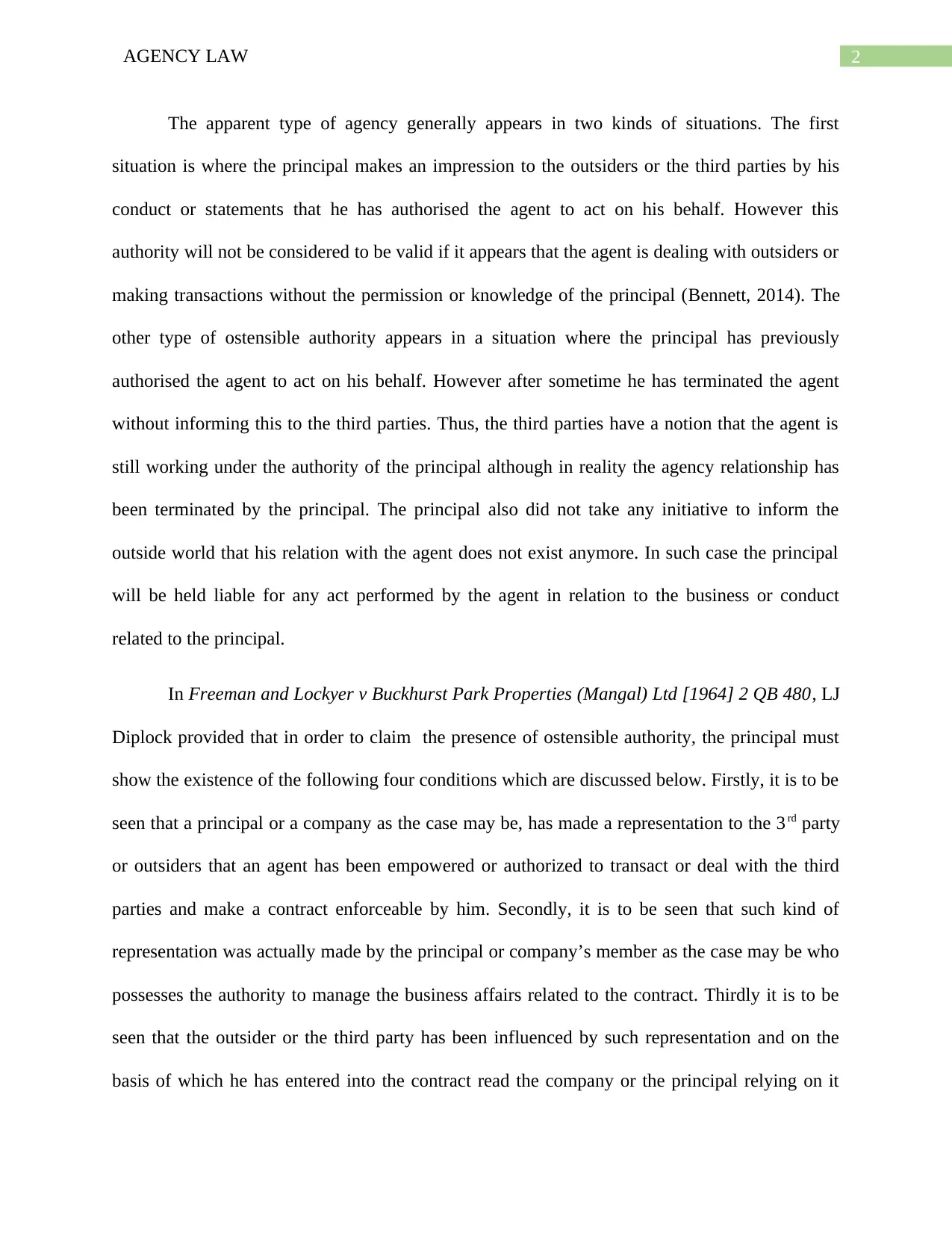
2AGENCY LAW
The apparent type of agency generally appears in two kinds of situations. The first
situation is where the principal makes an impression to the outsiders or the third parties by his
conduct or statements that he has authorised the agent to act on his behalf. However this
authority will not be considered to be valid if it appears that the agent is dealing with outsiders or
making transactions without the permission or knowledge of the principal (Bennett, 2014). The
other type of ostensible authority appears in a situation where the principal has previously
authorised the agent to act on his behalf. However after sometime he has terminated the agent
without informing this to the third parties. Thus, the third parties have a notion that the agent is
still working under the authority of the principal although in reality the agency relationship has
been terminated by the principal. The principal also did not take any initiative to inform the
outside world that his relation with the agent does not exist anymore. In such case the principal
will be held liable for any act performed by the agent in relation to the business or conduct
related to the principal.
In Freeman and Lockyer v Buckhurst Park Properties (Mangal) Ltd [1964] 2 QB 480, LJ
Diplock provided that in order to claim the presence of ostensible authority, the principal must
show the existence of the following four conditions which are discussed below. Firstly, it is to be
seen that a principal or a company as the case may be, has made a representation to the 3 rd party
or outsiders that an agent has been empowered or authorized to transact or deal with the third
parties and make a contract enforceable by him. Secondly, it is to be seen that such kind of
representation was actually made by the principal or company’s member as the case may be who
possesses the authority to manage the business affairs related to the contract. Thirdly it is to be
seen that the outsider or the third party has been influenced by such representation and on the
basis of which he has entered into the contract read the company or the principal relying on it
The apparent type of agency generally appears in two kinds of situations. The first
situation is where the principal makes an impression to the outsiders or the third parties by his
conduct or statements that he has authorised the agent to act on his behalf. However this
authority will not be considered to be valid if it appears that the agent is dealing with outsiders or
making transactions without the permission or knowledge of the principal (Bennett, 2014). The
other type of ostensible authority appears in a situation where the principal has previously
authorised the agent to act on his behalf. However after sometime he has terminated the agent
without informing this to the third parties. Thus, the third parties have a notion that the agent is
still working under the authority of the principal although in reality the agency relationship has
been terminated by the principal. The principal also did not take any initiative to inform the
outside world that his relation with the agent does not exist anymore. In such case the principal
will be held liable for any act performed by the agent in relation to the business or conduct
related to the principal.
In Freeman and Lockyer v Buckhurst Park Properties (Mangal) Ltd [1964] 2 QB 480, LJ
Diplock provided that in order to claim the presence of ostensible authority, the principal must
show the existence of the following four conditions which are discussed below. Firstly, it is to be
seen that a principal or a company as the case may be, has made a representation to the 3 rd party
or outsiders that an agent has been empowered or authorized to transact or deal with the third
parties and make a contract enforceable by him. Secondly, it is to be seen that such kind of
representation was actually made by the principal or company’s member as the case may be who
possesses the authority to manage the business affairs related to the contract. Thirdly it is to be
seen that the outsider or the third party has been influenced by such representation and on the
basis of which he has entered into the contract read the company or the principal relying on it
⊘ This is a preview!⊘
Do you want full access?
Subscribe today to unlock all pages.

Trusted by 1+ million students worldwide
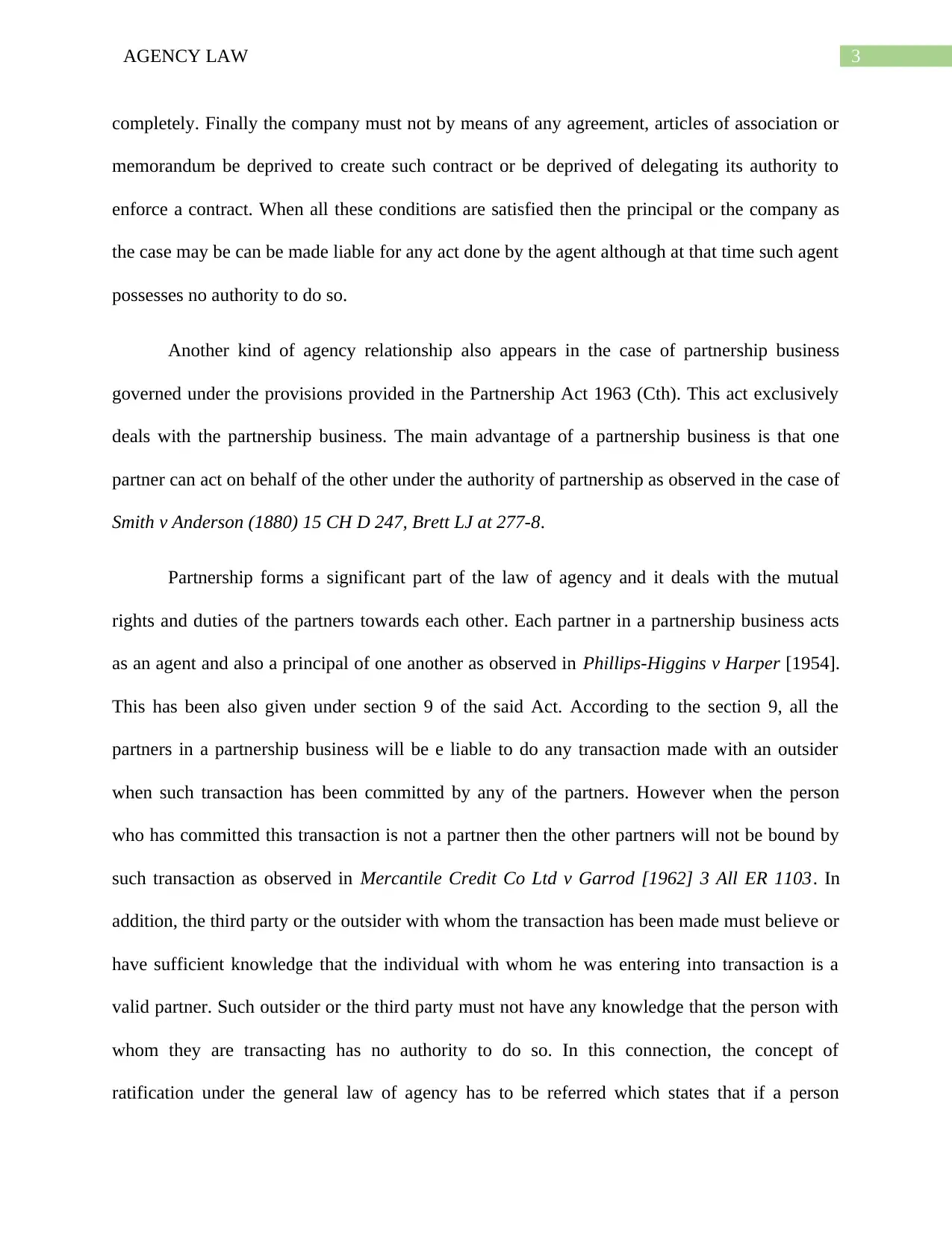
3AGENCY LAW
completely. Finally the company must not by means of any agreement, articles of association or
memorandum be deprived to create such contract or be deprived of delegating its authority to
enforce a contract. When all these conditions are satisfied then the principal or the company as
the case may be can be made liable for any act done by the agent although at that time such agent
possesses no authority to do so.
Another kind of agency relationship also appears in the case of partnership business
governed under the provisions provided in the Partnership Act 1963 (Cth). This act exclusively
deals with the partnership business. The main advantage of a partnership business is that one
partner can act on behalf of the other under the authority of partnership as observed in the case of
Smith v Anderson (1880) 15 CH D 247, Brett LJ at 277-8.
Partnership forms a significant part of the law of agency and it deals with the mutual
rights and duties of the partners towards each other. Each partner in a partnership business acts
as an agent and also a principal of one another as observed in Phillips-Higgins v Harper [1954].
This has been also given under section 9 of the said Act. According to the section 9, all the
partners in a partnership business will be e liable to do any transaction made with an outsider
when such transaction has been committed by any of the partners. However when the person
who has committed this transaction is not a partner then the other partners will not be bound by
such transaction as observed in Mercantile Credit Co Ltd v Garrod [1962] 3 All ER 1103. In
addition, the third party or the outsider with whom the transaction has been made must believe or
have sufficient knowledge that the individual with whom he was entering into transaction is a
valid partner. Such outsider or the third party must not have any knowledge that the person with
whom they are transacting has no authority to do so. In this connection, the concept of
ratification under the general law of agency has to be referred which states that if a person
completely. Finally the company must not by means of any agreement, articles of association or
memorandum be deprived to create such contract or be deprived of delegating its authority to
enforce a contract. When all these conditions are satisfied then the principal or the company as
the case may be can be made liable for any act done by the agent although at that time such agent
possesses no authority to do so.
Another kind of agency relationship also appears in the case of partnership business
governed under the provisions provided in the Partnership Act 1963 (Cth). This act exclusively
deals with the partnership business. The main advantage of a partnership business is that one
partner can act on behalf of the other under the authority of partnership as observed in the case of
Smith v Anderson (1880) 15 CH D 247, Brett LJ at 277-8.
Partnership forms a significant part of the law of agency and it deals with the mutual
rights and duties of the partners towards each other. Each partner in a partnership business acts
as an agent and also a principal of one another as observed in Phillips-Higgins v Harper [1954].
This has been also given under section 9 of the said Act. According to the section 9, all the
partners in a partnership business will be e liable to do any transaction made with an outsider
when such transaction has been committed by any of the partners. However when the person
who has committed this transaction is not a partner then the other partners will not be bound by
such transaction as observed in Mercantile Credit Co Ltd v Garrod [1962] 3 All ER 1103. In
addition, the third party or the outsider with whom the transaction has been made must believe or
have sufficient knowledge that the individual with whom he was entering into transaction is a
valid partner. Such outsider or the third party must not have any knowledge that the person with
whom they are transacting has no authority to do so. In this connection, the concept of
ratification under the general law of agency has to be referred which states that if a person
Paraphrase This Document
Need a fresh take? Get an instant paraphrase of this document with our AI Paraphraser
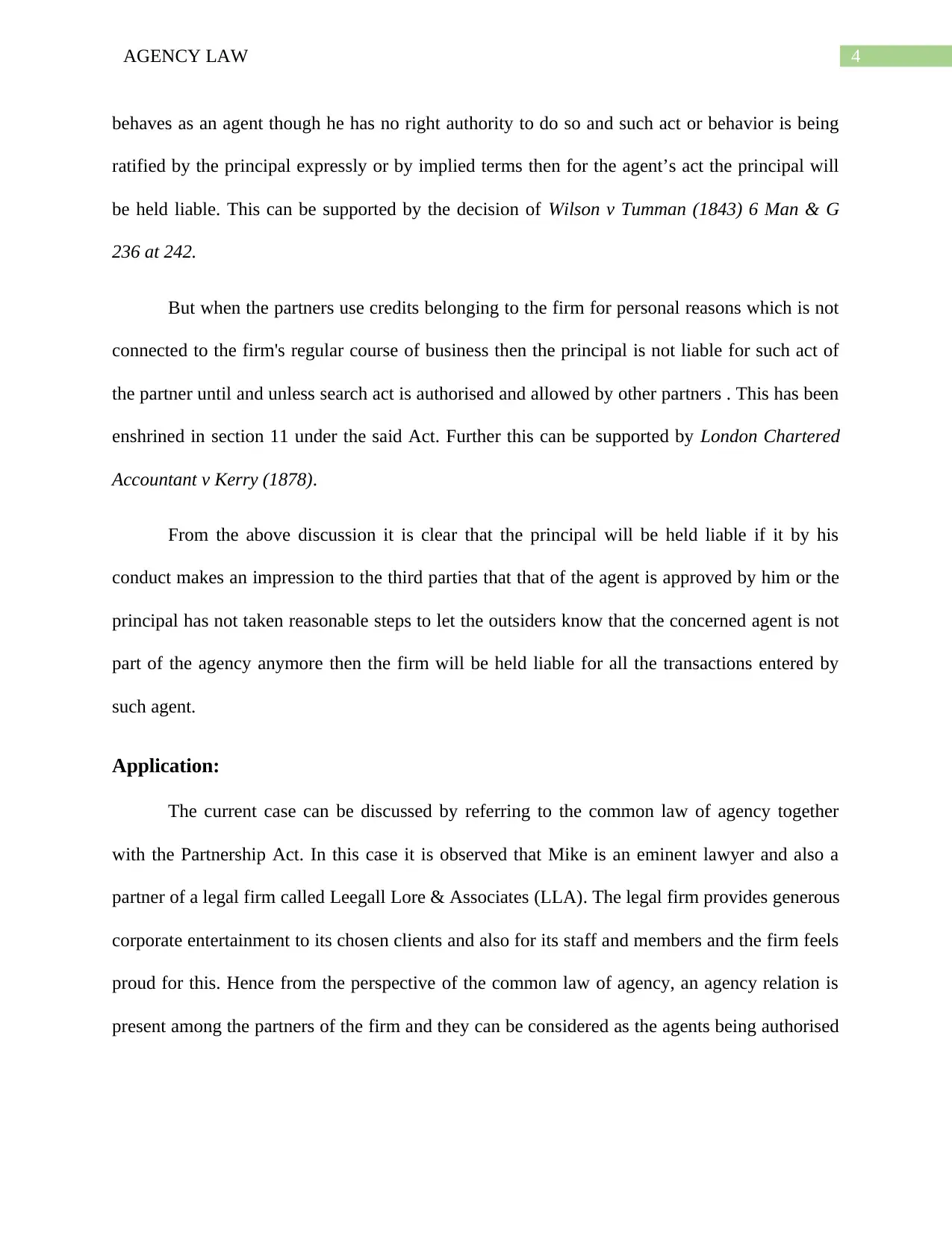
4AGENCY LAW
behaves as an agent though he has no right authority to do so and such act or behavior is being
ratified by the principal expressly or by implied terms then for the agent’s act the principal will
be held liable. This can be supported by the decision of Wilson v Tumman (1843) 6 Man & G
236 at 242.
But when the partners use credits belonging to the firm for personal reasons which is not
connected to the firm's regular course of business then the principal is not liable for such act of
the partner until and unless search act is authorised and allowed by other partners . This has been
enshrined in section 11 under the said Act. Further this can be supported by London Chartered
Accountant v Kerry (1878).
From the above discussion it is clear that the principal will be held liable if it by his
conduct makes an impression to the third parties that that of the agent is approved by him or the
principal has not taken reasonable steps to let the outsiders know that the concerned agent is not
part of the agency anymore then the firm will be held liable for all the transactions entered by
such agent.
Application:
The current case can be discussed by referring to the common law of agency together
with the Partnership Act. In this case it is observed that Mike is an eminent lawyer and also a
partner of a legal firm called Leegall Lore & Associates (LLA). The legal firm provides generous
corporate entertainment to its chosen clients and also for its staff and members and the firm feels
proud for this. Hence from the perspective of the common law of agency, an agency relation is
present among the partners of the firm and they can be considered as the agents being authorised
behaves as an agent though he has no right authority to do so and such act or behavior is being
ratified by the principal expressly or by implied terms then for the agent’s act the principal will
be held liable. This can be supported by the decision of Wilson v Tumman (1843) 6 Man & G
236 at 242.
But when the partners use credits belonging to the firm for personal reasons which is not
connected to the firm's regular course of business then the principal is not liable for such act of
the partner until and unless search act is authorised and allowed by other partners . This has been
enshrined in section 11 under the said Act. Further this can be supported by London Chartered
Accountant v Kerry (1878).
From the above discussion it is clear that the principal will be held liable if it by his
conduct makes an impression to the third parties that that of the agent is approved by him or the
principal has not taken reasonable steps to let the outsiders know that the concerned agent is not
part of the agency anymore then the firm will be held liable for all the transactions entered by
such agent.
Application:
The current case can be discussed by referring to the common law of agency together
with the Partnership Act. In this case it is observed that Mike is an eminent lawyer and also a
partner of a legal firm called Leegall Lore & Associates (LLA). The legal firm provides generous
corporate entertainment to its chosen clients and also for its staff and members and the firm feels
proud for this. Hence from the perspective of the common law of agency, an agency relation is
present among the partners of the firm and they can be considered as the agents being authorised
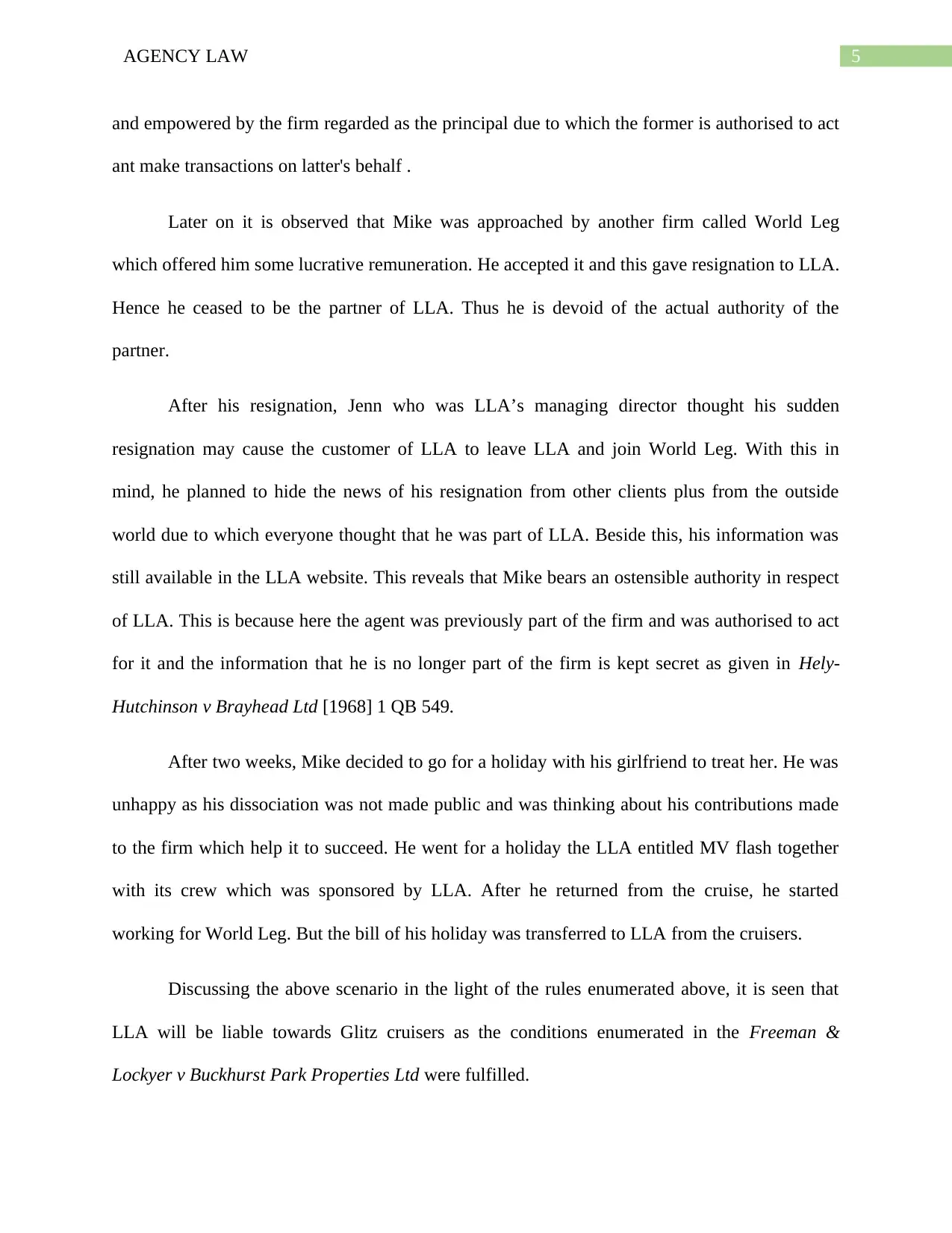
5AGENCY LAW
and empowered by the firm regarded as the principal due to which the former is authorised to act
ant make transactions on latter's behalf .
Later on it is observed that Mike was approached by another firm called World Leg
which offered him some lucrative remuneration. He accepted it and this gave resignation to LLA.
Hence he ceased to be the partner of LLA. Thus he is devoid of the actual authority of the
partner.
After his resignation, Jenn who was LLA’s managing director thought his sudden
resignation may cause the customer of LLA to leave LLA and join World Leg. With this in
mind, he planned to hide the news of his resignation from other clients plus from the outside
world due to which everyone thought that he was part of LLA. Beside this, his information was
still available in the LLA website. This reveals that Mike bears an ostensible authority in respect
of LLA. This is because here the agent was previously part of the firm and was authorised to act
for it and the information that he is no longer part of the firm is kept secret as given in Hely-
Hutchinson v Brayhead Ltd [1968] 1 QB 549.
After two weeks, Mike decided to go for a holiday with his girlfriend to treat her. He was
unhappy as his dissociation was not made public and was thinking about his contributions made
to the firm which help it to succeed. He went for a holiday the LLA entitled MV flash together
with its crew which was sponsored by LLA. After he returned from the cruise, he started
working for World Leg. But the bill of his holiday was transferred to LLA from the cruisers.
Discussing the above scenario in the light of the rules enumerated above, it is seen that
LLA will be liable towards Glitz cruisers as the conditions enumerated in the Freeman &
Lockyer v Buckhurst Park Properties Ltd were fulfilled.
and empowered by the firm regarded as the principal due to which the former is authorised to act
ant make transactions on latter's behalf .
Later on it is observed that Mike was approached by another firm called World Leg
which offered him some lucrative remuneration. He accepted it and this gave resignation to LLA.
Hence he ceased to be the partner of LLA. Thus he is devoid of the actual authority of the
partner.
After his resignation, Jenn who was LLA’s managing director thought his sudden
resignation may cause the customer of LLA to leave LLA and join World Leg. With this in
mind, he planned to hide the news of his resignation from other clients plus from the outside
world due to which everyone thought that he was part of LLA. Beside this, his information was
still available in the LLA website. This reveals that Mike bears an ostensible authority in respect
of LLA. This is because here the agent was previously part of the firm and was authorised to act
for it and the information that he is no longer part of the firm is kept secret as given in Hely-
Hutchinson v Brayhead Ltd [1968] 1 QB 549.
After two weeks, Mike decided to go for a holiday with his girlfriend to treat her. He was
unhappy as his dissociation was not made public and was thinking about his contributions made
to the firm which help it to succeed. He went for a holiday the LLA entitled MV flash together
with its crew which was sponsored by LLA. After he returned from the cruise, he started
working for World Leg. But the bill of his holiday was transferred to LLA from the cruisers.
Discussing the above scenario in the light of the rules enumerated above, it is seen that
LLA will be liable towards Glitz cruisers as the conditions enumerated in the Freeman &
Lockyer v Buckhurst Park Properties Ltd were fulfilled.
⊘ This is a preview!⊘
Do you want full access?
Subscribe today to unlock all pages.

Trusted by 1+ million students worldwide
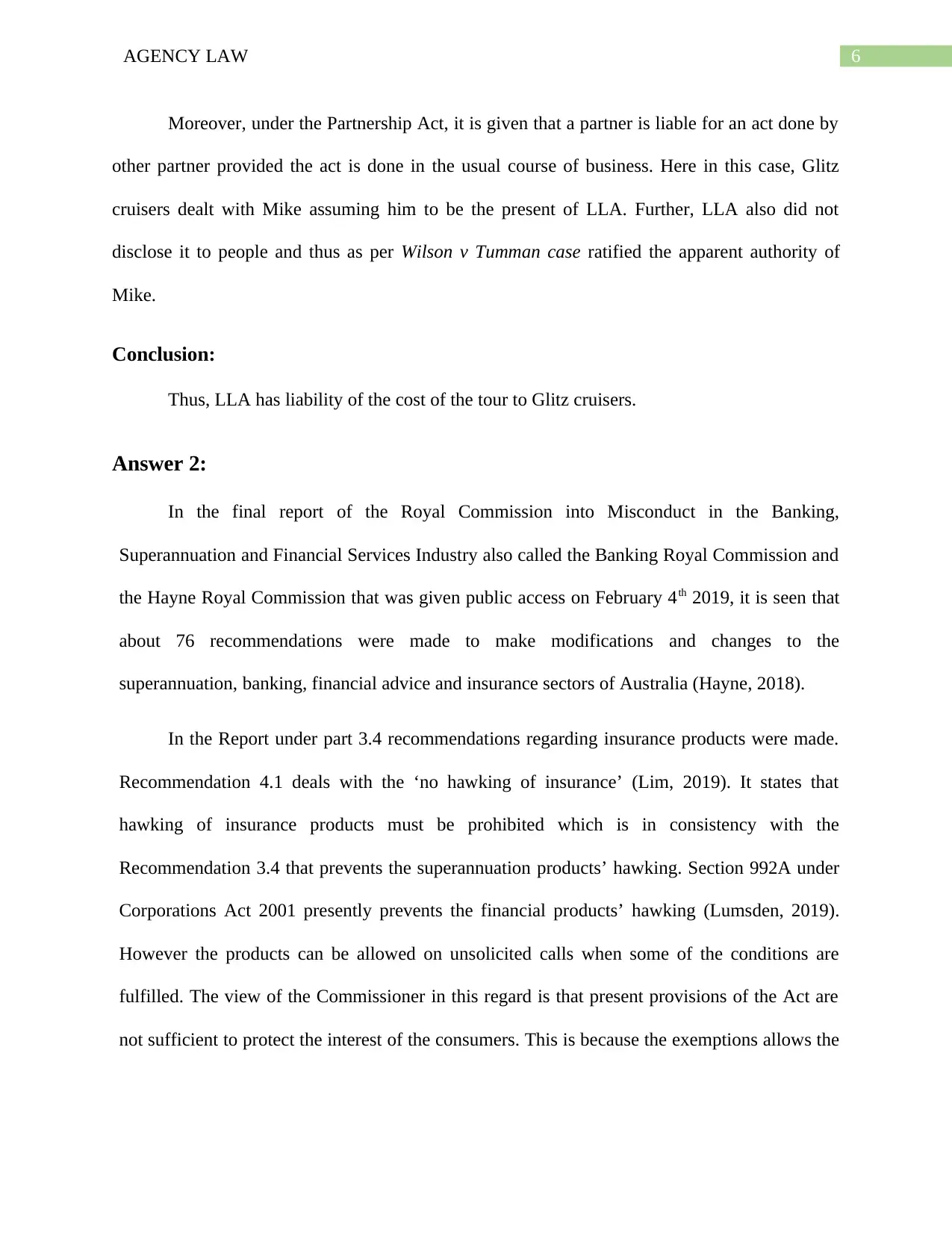
6AGENCY LAW
Moreover, under the Partnership Act, it is given that a partner is liable for an act done by
other partner provided the act is done in the usual course of business. Here in this case, Glitz
cruisers dealt with Mike assuming him to be the present of LLA. Further, LLA also did not
disclose it to people and thus as per Wilson v Tumman case ratified the apparent authority of
Mike.
Conclusion:
Thus, LLA has liability of the cost of the tour to Glitz cruisers.
Answer 2:
In the final report of the Royal Commission into Misconduct in the Banking,
Superannuation and Financial Services Industry also called the Banking Royal Commission and
the Hayne Royal Commission that was given public access on February 4th 2019, it is seen that
about 76 recommendations were made to make modifications and changes to the
superannuation, banking, financial advice and insurance sectors of Australia (Hayne, 2018).
In the Report under part 3.4 recommendations regarding insurance products were made.
Recommendation 4.1 deals with the ‘no hawking of insurance’ (Lim, 2019). It states that
hawking of insurance products must be prohibited which is in consistency with the
Recommendation 3.4 that prevents the superannuation products’ hawking. Section 992A under
Corporations Act 2001 presently prevents the financial products’ hawking (Lumsden, 2019).
However the products can be allowed on unsolicited calls when some of the conditions are
fulfilled. The view of the Commissioner in this regard is that present provisions of the Act are
not sufficient to protect the interest of the consumers. This is because the exemptions allows the
Moreover, under the Partnership Act, it is given that a partner is liable for an act done by
other partner provided the act is done in the usual course of business. Here in this case, Glitz
cruisers dealt with Mike assuming him to be the present of LLA. Further, LLA also did not
disclose it to people and thus as per Wilson v Tumman case ratified the apparent authority of
Mike.
Conclusion:
Thus, LLA has liability of the cost of the tour to Glitz cruisers.
Answer 2:
In the final report of the Royal Commission into Misconduct in the Banking,
Superannuation and Financial Services Industry also called the Banking Royal Commission and
the Hayne Royal Commission that was given public access on February 4th 2019, it is seen that
about 76 recommendations were made to make modifications and changes to the
superannuation, banking, financial advice and insurance sectors of Australia (Hayne, 2018).
In the Report under part 3.4 recommendations regarding insurance products were made.
Recommendation 4.1 deals with the ‘no hawking of insurance’ (Lim, 2019). It states that
hawking of insurance products must be prohibited which is in consistency with the
Recommendation 3.4 that prevents the superannuation products’ hawking. Section 992A under
Corporations Act 2001 presently prevents the financial products’ hawking (Lumsden, 2019).
However the products can be allowed on unsolicited calls when some of the conditions are
fulfilled. The view of the Commissioner in this regard is that present provisions of the Act are
not sufficient to protect the interest of the consumers. This is because the exemptions allows the
Paraphrase This Document
Need a fresh take? Get an instant paraphrase of this document with our AI Paraphraser
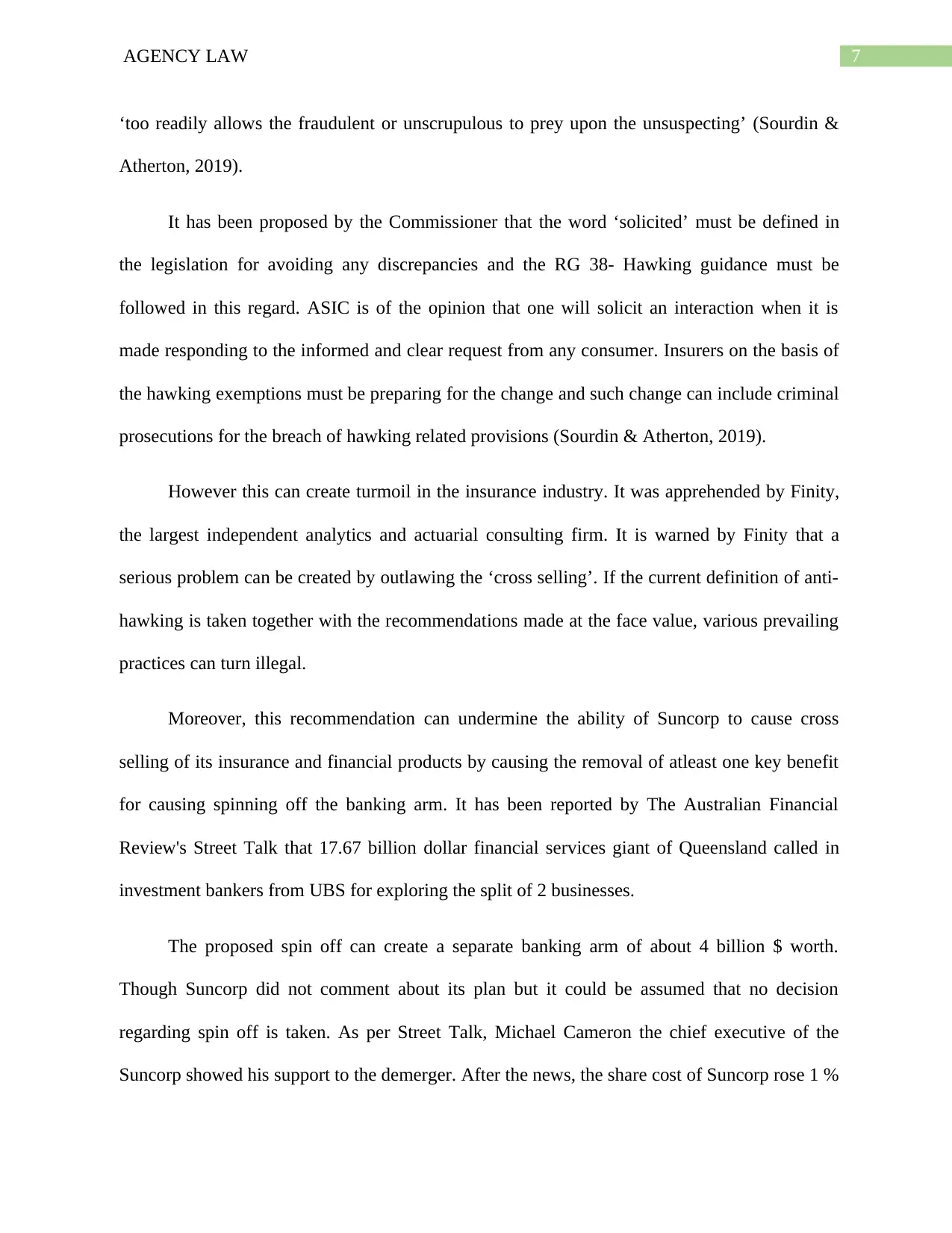
7AGENCY LAW
‘too readily allows the fraudulent or unscrupulous to prey upon the unsuspecting’ (Sourdin &
Atherton, 2019).
It has been proposed by the Commissioner that the word ‘solicited’ must be defined in
the legislation for avoiding any discrepancies and the RG 38- Hawking guidance must be
followed in this regard. ASIC is of the opinion that one will solicit an interaction when it is
made responding to the informed and clear request from any consumer. Insurers on the basis of
the hawking exemptions must be preparing for the change and such change can include criminal
prosecutions for the breach of hawking related provisions (Sourdin & Atherton, 2019).
However this can create turmoil in the insurance industry. It was apprehended by Finity,
the largest independent analytics and actuarial consulting firm. It is warned by Finity that a
serious problem can be created by outlawing the ‘cross selling’. If the current definition of anti-
hawking is taken together with the recommendations made at the face value, various prevailing
practices can turn illegal.
Moreover, this recommendation can undermine the ability of Suncorp to cause cross
selling of its insurance and financial products by causing the removal of atleast one key benefit
for causing spinning off the banking arm. It has been reported by The Australian Financial
Review's Street Talk that 17.67 billion dollar financial services giant of Queensland called in
investment bankers from UBS for exploring the split of 2 businesses.
The proposed spin off can create a separate banking arm of about 4 billion $ worth.
Though Suncorp did not comment about its plan but it could be assumed that no decision
regarding spin off is taken. As per Street Talk, Michael Cameron the chief executive of the
Suncorp showed his support to the demerger. After the news, the share cost of Suncorp rose 1 %
‘too readily allows the fraudulent or unscrupulous to prey upon the unsuspecting’ (Sourdin &
Atherton, 2019).
It has been proposed by the Commissioner that the word ‘solicited’ must be defined in
the legislation for avoiding any discrepancies and the RG 38- Hawking guidance must be
followed in this regard. ASIC is of the opinion that one will solicit an interaction when it is
made responding to the informed and clear request from any consumer. Insurers on the basis of
the hawking exemptions must be preparing for the change and such change can include criminal
prosecutions for the breach of hawking related provisions (Sourdin & Atherton, 2019).
However this can create turmoil in the insurance industry. It was apprehended by Finity,
the largest independent analytics and actuarial consulting firm. It is warned by Finity that a
serious problem can be created by outlawing the ‘cross selling’. If the current definition of anti-
hawking is taken together with the recommendations made at the face value, various prevailing
practices can turn illegal.
Moreover, this recommendation can undermine the ability of Suncorp to cause cross
selling of its insurance and financial products by causing the removal of atleast one key benefit
for causing spinning off the banking arm. It has been reported by The Australian Financial
Review's Street Talk that 17.67 billion dollar financial services giant of Queensland called in
investment bankers from UBS for exploring the split of 2 businesses.
The proposed spin off can create a separate banking arm of about 4 billion $ worth.
Though Suncorp did not comment about its plan but it could be assumed that no decision
regarding spin off is taken. As per Street Talk, Michael Cameron the chief executive of the
Suncorp showed his support to the demerger. After the news, the share cost of Suncorp rose 1 %
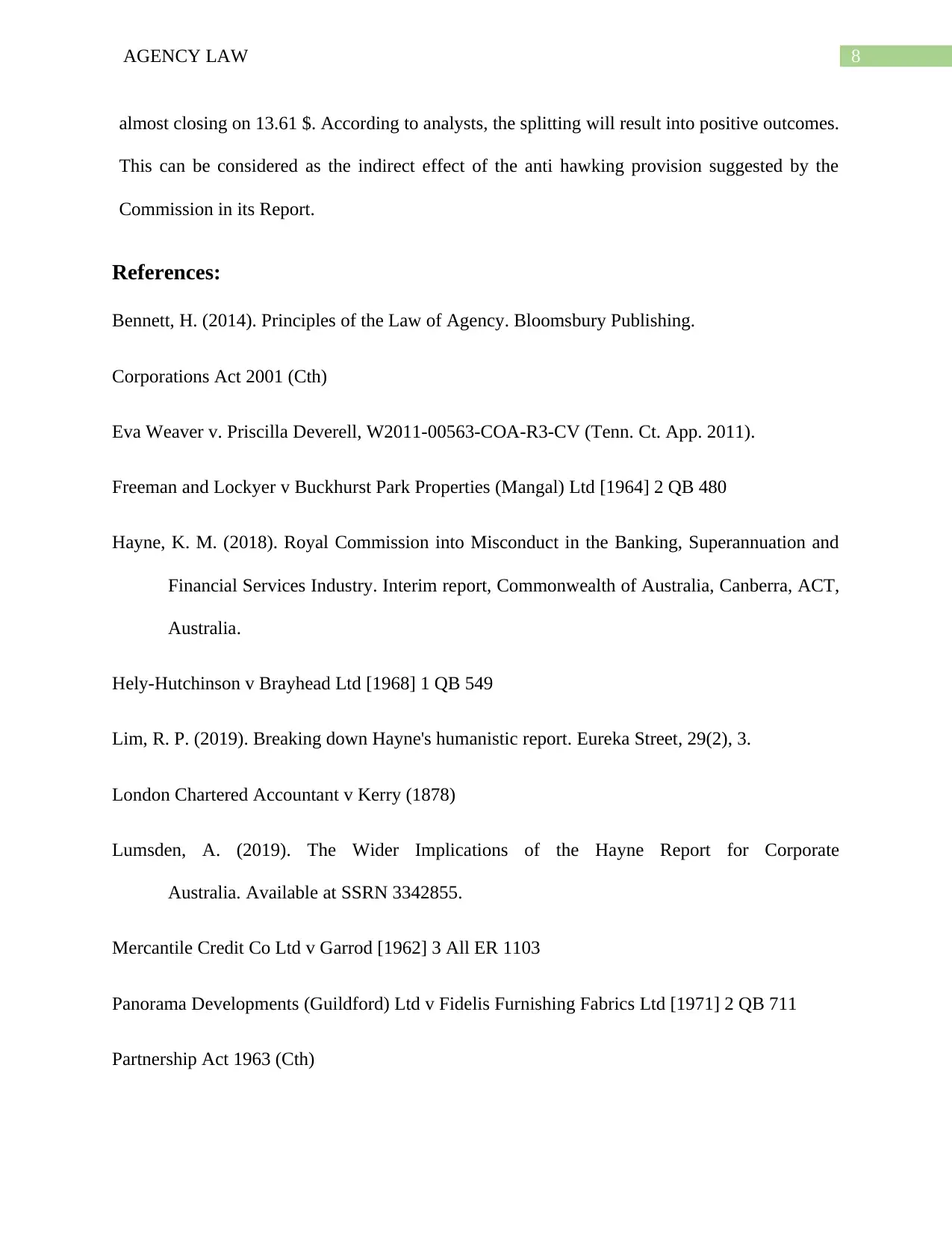
8AGENCY LAW
almost closing on 13.61 $. According to analysts, the splitting will result into positive outcomes.
This can be considered as the indirect effect of the anti hawking provision suggested by the
Commission in its Report.
References:
Bennett, H. (2014). Principles of the Law of Agency. Bloomsbury Publishing.
Corporations Act 2001 (Cth)
Eva Weaver v. Priscilla Deverell, W2011-00563-COA-R3-CV (Tenn. Ct. App. 2011).
Freeman and Lockyer v Buckhurst Park Properties (Mangal) Ltd [1964] 2 QB 480
Hayne, K. M. (2018). Royal Commission into Misconduct in the Banking, Superannuation and
Financial Services Industry. Interim report, Commonwealth of Australia, Canberra, ACT,
Australia.
Hely-Hutchinson v Brayhead Ltd [1968] 1 QB 549
Lim, R. P. (2019). Breaking down Hayne's humanistic report. Eureka Street, 29(2), 3.
London Chartered Accountant v Kerry (1878)
Lumsden, A. (2019). The Wider Implications of the Hayne Report for Corporate
Australia. Available at SSRN 3342855.
Mercantile Credit Co Ltd v Garrod [1962] 3 All ER 1103
Panorama Developments (Guildford) Ltd v Fidelis Furnishing Fabrics Ltd [1971] 2 QB 711
Partnership Act 1963 (Cth)
almost closing on 13.61 $. According to analysts, the splitting will result into positive outcomes.
This can be considered as the indirect effect of the anti hawking provision suggested by the
Commission in its Report.
References:
Bennett, H. (2014). Principles of the Law of Agency. Bloomsbury Publishing.
Corporations Act 2001 (Cth)
Eva Weaver v. Priscilla Deverell, W2011-00563-COA-R3-CV (Tenn. Ct. App. 2011).
Freeman and Lockyer v Buckhurst Park Properties (Mangal) Ltd [1964] 2 QB 480
Hayne, K. M. (2018). Royal Commission into Misconduct in the Banking, Superannuation and
Financial Services Industry. Interim report, Commonwealth of Australia, Canberra, ACT,
Australia.
Hely-Hutchinson v Brayhead Ltd [1968] 1 QB 549
Lim, R. P. (2019). Breaking down Hayne's humanistic report. Eureka Street, 29(2), 3.
London Chartered Accountant v Kerry (1878)
Lumsden, A. (2019). The Wider Implications of the Hayne Report for Corporate
Australia. Available at SSRN 3342855.
Mercantile Credit Co Ltd v Garrod [1962] 3 All ER 1103
Panorama Developments (Guildford) Ltd v Fidelis Furnishing Fabrics Ltd [1971] 2 QB 711
Partnership Act 1963 (Cth)
⊘ This is a preview!⊘
Do you want full access?
Subscribe today to unlock all pages.

Trusted by 1+ million students worldwide
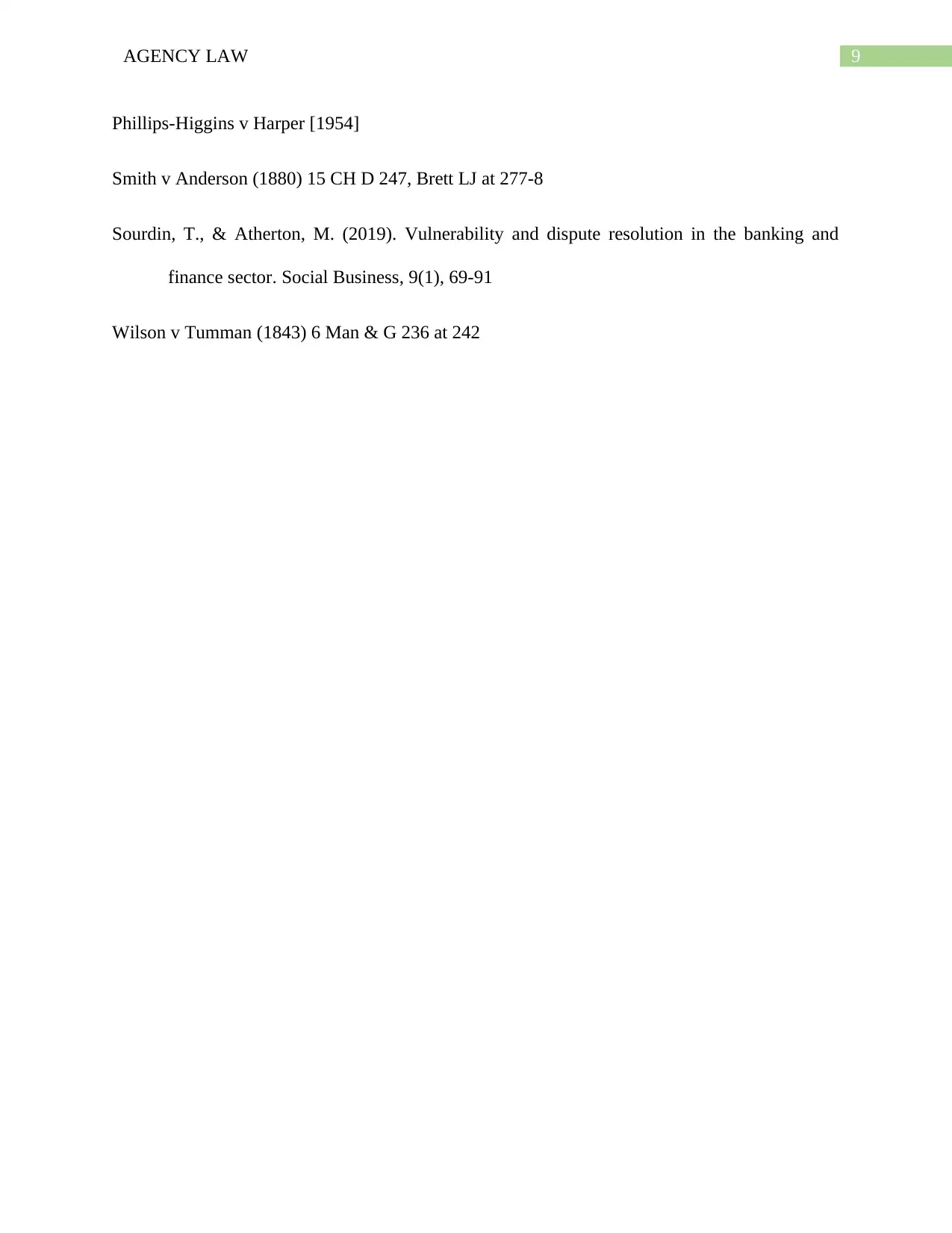
9AGENCY LAW
Phillips-Higgins v Harper [1954]
Smith v Anderson (1880) 15 CH D 247, Brett LJ at 277-8
Sourdin, T., & Atherton, M. (2019). Vulnerability and dispute resolution in the banking and
finance sector. Social Business, 9(1), 69-91
Wilson v Tumman (1843) 6 Man & G 236 at 242
Phillips-Higgins v Harper [1954]
Smith v Anderson (1880) 15 CH D 247, Brett LJ at 277-8
Sourdin, T., & Atherton, M. (2019). Vulnerability and dispute resolution in the banking and
finance sector. Social Business, 9(1), 69-91
Wilson v Tumman (1843) 6 Man & G 236 at 242
1 out of 10
Related Documents
Your All-in-One AI-Powered Toolkit for Academic Success.
+13062052269
info@desklib.com
Available 24*7 on WhatsApp / Email
![[object Object]](/_next/static/media/star-bottom.7253800d.svg)
Unlock your academic potential
Copyright © 2020–2026 A2Z Services. All Rights Reserved. Developed and managed by ZUCOL.





